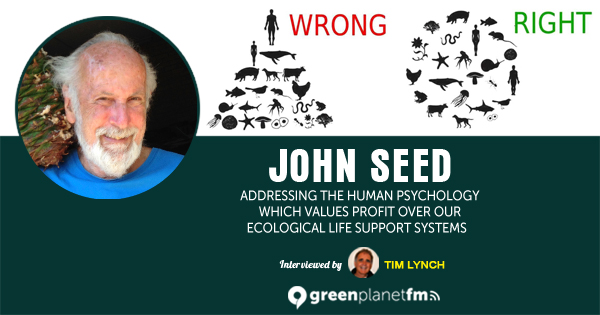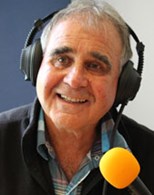
John gets us in touch with the psychological dimension of our environmental crisis to get beyond the denial that most people greet the news - as to what
is happening to our world – and if we are in denial about the terrible plight that our planet’s in –then our ability to celebrate the beauty of nature
and the glory of the cosmos is severely hampered – because it’s resting on a very unstable foundation.
John’s work over many decades has been in collaboration with Joanna Macy from the USA. They encourage people to recognise that our deepest feelings of
despair and anguish about what’s happening to our world, are an integral part of us being able to celebrate and glory in the wonders of nature and
the wonders of creation. That if we are in denial and are unwilling to feel and to share our pain as to what’s happening to our world, then we are
also unable to truly celebrate the beauty, that surround us.
This has led him to take people who are needing to be healed ‘on a journey’ so as to let them confront their hurt and fears and - from a psychological
standpoint reconcile and rectify the trauma that they are witnessing across the face of nature today. This is an Australian story of a seminal conflict
between the forest industry and the conservation movement over rainforests in northern New South Wales.
The battle over logging the rainforests of Terania Creek in 1979 started the Rainforest War in New South Wales. Some claimed Terania Creek to be the last
un-logged rainforest in Australia. The war was a clash of values and cultures, but three important lessons came about from this conflict. These being
the influence of the media, the role of science and ecology, and the spirituality of forests.
This ecological battle started a process that saw the eventual closure to logging and reservation in national parks of 900,000 ha of native forest, or
about one third of the productive State Forests of New South Wales.
This halted the logging and sparked the NSW government's decision to gazette the remaining rainforest in NSW as a National Park.
John states “that even though we won that battle there are so many other battles...and in lots of ways they got worse."
"We still find it really hard to imagine that it was the first time people actively got out and protected the rainforest."
However John soon realised that in spite of the success of saving that forest and the wildlife that abounded, in looking at what was happening all around
our planet - for every forest that was being protected, a thousand forests were being lost. And he saw clearly that there was no way we could save
our planet at one forest at a time.
That unless we address the underlying psychological or spiritual disease that afflicts modern humans one that somehow allows us to imagine that we can
somehow profit from the destruction of our own life support systems – and that these actions are very enjoyable and rewarding for the participants
- it would be of no particular significance to the future of the world.
So John began to study to understand why do we behave is such a self-defeating manner?
He mentions Paul Ehrlich, the famous American ecologist and population commentator
who said “we are sawing off the branch that we are sitting on".
Clearly this indicates a psychological problem no matter how much the timber in that branch might be worth – it can’t profit us to do this. And through
this enquiry he came upon a philosophy of nature called Deep Ecology.
And this is where he could understand why we were behaving in this way. Deep Ecology was coined by the Norwegian - the late Arne Naess the emeritus Professor of Philosophy at Oslo University who said the underlying all the symptoms of the environmental
crisis was the illusion of separation between ourselves and that of the natural world. The illusion … and this has grown into anthropocentrism
or human centeredness.
The idea that we human beings are the centre of everything. This view sees us being the crown of creation - the measure of all being … and that
nothing has any value except human beings – nothing is intrinsic. Things can have instrumental value if they are a resource for us. But really, we
do not look at life as being a web or, if we do happen to see life as a web – we are the spider in the centre of it.
We are still unable to understand the science of ecology and the wisdom of indigenous people reveals we are but one strand in that web and if we destroy
the other strands we destroy ourselves.
John’s workshops look to how most indigenous societies practice and reiterate the connection between human beings and that ‘all our relations’ are not
severed. Every indigenous culture has ceremonies and rituals that allow the human family to celebrate our connectedness and to nourish that connectedness.
And these ceremonies involve the entire community and the children are there and are watching and are learning this. Indigenous people have this knowing
that we are rooted and draw energy and nourishment from the living earth and enact it with reverence for nature in all their ceremonies – so as to
never forget their roots. (When were you last bare footed walking on the grass of the earth?)
For 30 years John has been developing methods and skills to move us from a social identity to an ecological identity.
This interview covers Wetko – the mind virus that has infected materialist man and what we need to recognise - to break free. That the First Nation American
peoples - saw the very connection to Mother Earth when recently here in NZ one visitor put on a small campfire, a dry branch of wood and reverently
stated “to all our relations” – that the tree is of life, giving us light and warmth as well as taking in Co2 and giving us oxygen back.
Everything is connected. We are all in a grand cycle called life and it is this wonder of the web of life that is threatened by our foolish behaviour today.…
An experiential process of deep connection – That Joanna Macy & John designed back in the mid eighties – and the book ‘Thinking like a mountain towards
the Council of all Beings… translated onto a dozen languages - Now in Mandarin
Originally Joanna taught “despair and empowerment “ and it is now called “honouring our pain for the world.”
Once certain boundaries are set – people are invited to share their deepest feelings of anguish, despair and horror at what’s happening to our world.
This is a rare opportunity because if anyone even hinted at expressing their feelings around this subject - under ordinary circumstances people instantly
want to change the subject as everyone feels threatened when such feelings are openly expressed. But, as people are taken through this exercise – what
follows is empowerment and we discover that (listen to the broadcast that John eloquently shows us a way out) - the end result is a celebration that
then becomes possible!
Thomas Berry’s name is mentioned http://thomasberry.org/
A Catholic theologian, who instead of focussing his attention on the Heavens to find God, became a geo seer – studying the Ancient Greek word Geo – where
we get as a prefix …for geology, geography, geometry, geodesy, geopolitics etc. Our planet.
The study of the earth … Is another way to see our connection to the earth in such another way as to experience a deeper relationship and link to
the earth.
http://drewdellinger.org/ Poet who wrote the poetic introduction that John introduced us with at the state of this
interview.
Also http://www.genesisfarm.org/about.taf Sister Miriam MacGillis of Genesis Farm that is dedicated
to understanding the Universe and Earth as a single, unfolding process. That Genesis Farm offers diverse and innovative experiences that inspire a
comprehensive approach to personal and social change. As a community facility it is open to all who are interested in exploring the sacredness of the
land, their mission and their work.
Sister Miriam MacGillis created a process called the cosmic walk – and this is what John’s workshop will do on this coming Saturday night. (1st April 2017
at Kawai Purapura. See below) A spiralling story of the creation and the evolution of life. Which everyone participates in.
John then tells of his work in India, which as a country he says has given him so much inspiration to awaken his spirituality - that:
Bruce Lipton’s name comes up again with his work in India around organics and farming.
http://www.organicindia.com/ and Bharat Mitra. This became a movement in organic and biodynamic farming methods
that were developed and practiced. The founder's mission being to offer safe effective herbal products to the world and he is the driving force behind
an organic revolution that started with ORGANIC INDIA and is now taking root all across India.
https://naturedesignsjohnfranci.com/projects-implemented/
In 1988 John, who is a founder and Director of the Rainforest Information Centre (RIC) was asked to assist in the co-ordination of the Annamalai Reforestation
Society’s project to green the sacred mountain of Arunachala in South India. Now the mountain reforestation has advanced a long way since then. There
is a good collection of different organisations working together to ensure the the success of the project. http://www.theforestway.org/greening/overview.html
Land rights for the Poor of India. John has been assisting these people for some time.
In December 2015, Rajeev wrote to John that the campaign to establish land-rights for the Katkari and other Adivasis was finally bearing fruit and “will
help resolve the insecure village land issue in at least 600 – 700 Katkari villages”.
http://www.rainforestinfo.org.au/projects/india/rajeev3-16proposal.htm
The next steps are tree plantings to improve the fertility and productivity of their land. However, suitable native tree seedlings were not available and
they are establishing a nursery “to ensure multiplication of diverse native plant species (fruits, uncultivated foods, vegetables, medicinal plants,
fibre plants, sacred plants, flowering plants, natural dyes, etc)”
This interview of John Seed shows a dedicated man working for the earth.
Big Data Info: http://rainforests.mongabay.com
For the best information go to https://workthatreconnects.org/event/john-seed-in-new-zealand
